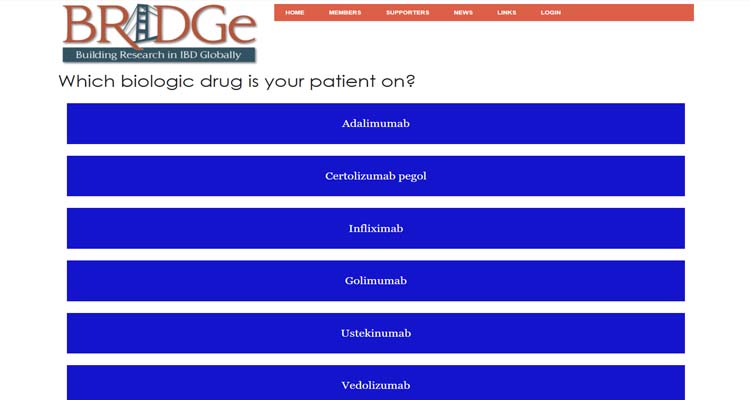Monoklonale Antikörper gegen Entzündungsmediatoren, sogenannte Biologika oder Biosimilars, werden seit mehr als 10 Jahren zur Behandlung chronisch-entzündlicher Darmerkrankungen (CED) wie Morbus Crohn und der Colitis ulcerosa eingesetzt.
Für eine optimale Behandlung, ist es wichtig die Medikamentenkonzentration (Through Level) im Blut des Patienten zu überprüfen. Anhand der gemessenen Medikamentenkonzentration kann die Therapie optimiert werden.
R-Biopharm stellt den TDM-Checker und die Behandlung mit Infliximab auf der Grundlage der Taxittrial-Ergebnisse ein.
Es gibt mehr Biologika / Biosimilars als Infliximab, deshalb haben wir entschieden, dass der BridgeIBD Biologic-Therapy-Optimizer ein besseres Werkzeug für Sie als medizinisches Fachpersonal ist.
Der folgende Link führt sie zu einem interaktiven Tool, das Fachkräften des Gesundheitswesens Hilfestellung bei der Interpretation der gemessenen Konzentration von Arzneimitteln und Anti-Arzneimittel-Antikörpern geben soll. Hier finden sie u.a. Empfehlungen für Infliximab (Remicade®), Adalimumab (Humira®), Vedolizumab (Entyvio®), Golimumab (Simponi®) und Ustekinumab (Stelara®). Und die Biosimilars für Infliximab (Remsima®, Inflectra ®, Flixabi®, Zessly®), Adalimumab (Amgevita®, Amsparity®, Hefiya®, Hulio®, Hyrimoz®, Idacio®, Imraldi®, Yufluma®)
Die BRIDGe-Gruppe ist ein Zusammenschluss von Gastroenterologen, die Experten auf dem Gebiet der CED-Patientenversorgung sind und sich auf die patientenzentrierte klinische CED-Forschung konzentrieren.
R-Biopharm hat von der BridgeIBD-Gruppe die Erlaubnis erhalten, den Link zum BridgeIBD Biologic-Therapy-Optimizer zu platzieren.
Reference:
Appropriate Therapeutic Drug Monitoring of Biologic Agents for Patients With Inflammatory Bowel Diseases Konstantinos Papamichael, Adam S. Cheifetz, Gil Y. Melmed, Peter M. Irving, Niels Vande Casteele, Patricia L. Kozuch, Laura E. Raffals, Leonard Baidoo, Brian Bressler, Shane M. Devlin, Jennifer Jones, Gilaad G. Kaplan, Miles P. Sparrow, Fernando S. Velayos, Thomas Ullman and Corey A. Siegel

Interaktiv: TDM
Das interaktive Tool von BRIDGe, das Ihnen hilft, auf der Grundlage der gemessenen Arzneimittelkonzentrationen die richtige Therapieentscheidung zu treffen.
oder Therapeutic Drug Monitoring bedeutet die Messung der Medikamentenspiegel im Blut des Patienten, um die Dosis individuell an die Bedürfnisse des Patienten anzupassen. Dadurch kann das Medikament optimal wirken und die Therapiekosten können gesenkt werden.
Mehr erfahrenThe TDM Checker is a tool intended to provide assistance for health care professionals such as gastroenterologists, laboratory personnel and specialized nurses regarding the interpretation of drug and anti-drug antibody concentrations, as measured using the RIDASCREEN® and RIDA®QUICK tests. It is known, that different infliximab and anti-infliximab antibody monitoring assays may report different concentrations due to assay-specific variabilities in performance. It is advisable to use one single assay to measure drug and anti-drug antibodies in patients.
The threshold concentrations of the TDM Checker have been based on trough concentrations during maintenance phase, i.e. the drug and anti-drug antibody concentration just before the next dose administration. Different threshold concentrations may apply for samples withdrawn at peak or intermediate time points.
PLEASE NOTE: The TDM Checker is a supporting tool only and has to be used strictly in conjunction with other clinical, biological and endoscopic findings.
IT DOES NOT REPLACE PROPER CLINICAL JUDGEMENT.
It is recommended to test for drug and anti-drug antibody trough concentrations at consecutive doses to optimize treatment (Dreesen et al. Clinical Pharmacology: Advances and Applications 2017;9:10-111). Please adhere to local guidelines for the management of patients treated with biological drugs.
Various patient, drug and disease specific characteristics are known to influence treatment outcomes in patients with inflammatory bowel diseases, such as baseline disease activity, treatment adherence and immunogenicity. In addition, higher trough concentrations have been suggested to be associated with response and remission in patients with specific disease phenotypes, such as patients with perianal disease, or when targeting endoscopic healing. The drug and anti-drug antibody concentration should therefore – in any case – not be interpreted as the sole indicator of a treatment change and have to be used in the context of the clinical status of the patient and together with other laboratory results.
The TDM Checker has been developed based on consensus statements, appropriateness scores and evidence from pivotal clinical studies. The described situations reflect real-life clinical practice, but may not be entirely representative for each and every individual patient. It is based on the following studies:
The TDM Checker is a supporting tool only and has to be used strictly in conjunction with other clinical, biological and endoscopic findings.
IT DOES NOT REPLACE PROPER CLINICAL JUDGEMENT.
Although carefully drafted to the best of its knowledge, the site owner and/or its affiliates do not assume any liability regarding the content of the TDM Checker tool and/or any respective results nor provide any warranties whatsoever. The user accepts that the usage of the TDM Checker tool is at his or her complete responsibility and therefore will indemnify and hold harmless the site owner and/or its affiliates from any claims resulting out of or in connection with the usage of the TDM Checker tool. By clicking the “accept terms and conditions of use” button below, the user claims to have read and to have accepted these terms and conditions of use.
Wählen Sie das Medikament, das Ihr Patient einnimmt (derzeit nur Infliximab verfügbar), und los geht’s!
Please note: If the drug concentration of infliximab is >1 µg/mL, anti-drug antibody concentrations will be undetectable using the RIDASCREEN® Anti-IFX Antibodies. The RIDASCREEN® Anti-IFX Antibodies is a drug-sensitive test and cannot detect antibodies when infliximab concentrations are present. In addition, following Mitrev et al. there is insufficient evidence for the use of a drug-tolerant assay.
* It is recommended to confirm active disease with an objective measure of inflammation (e.g., colonoscopy, imaging, CRP). It is recommended to verify adherence to therapy.
Your Choices
Outcome
| Potential action | Recommendation |
|---|






